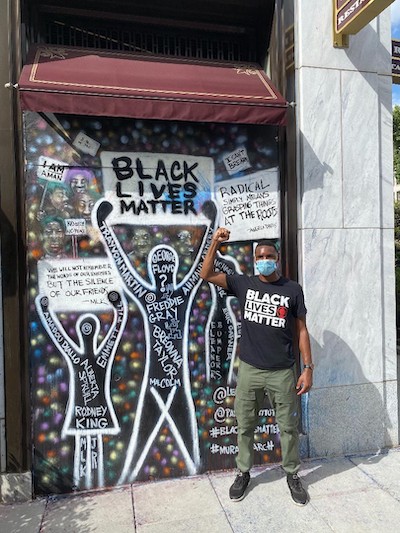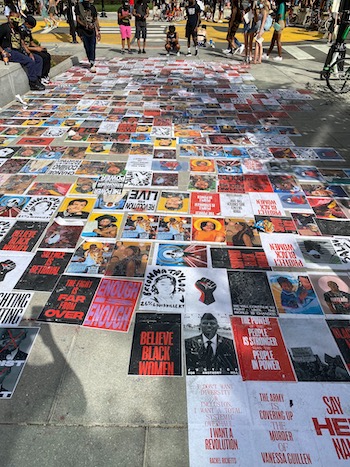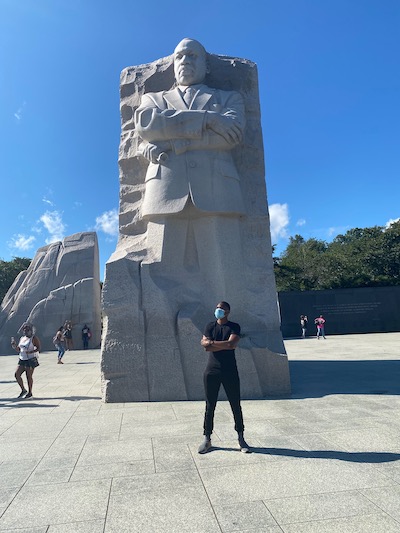On Friday, August 28th, 2020, Equity member Shawn Bowers joined the March on Washington led by The National Action Network in Washington, D.C. This is an account of his experience at the event.
By Shawn Bowers
The exuberance and gravitas of the March on Washington led by The National Action Network in Washington, D.C. on Friday, August 28, 2020 rivaled that of the March on Washington for Jobs and Freedom on August 28th, 1963. In both marches, there was a bellowing cry for America to live up to its true potential as the land of the free. During the March on Washington in 1963, the great civil rights activist Martin Luther King, Jr. preached, “Freedom is never voluntarily granted by the oppressor. It must be demanded by the oppressed.” Dr. King’s message, that we must actively engage in our democracy, echoed throughout the Lincoln Memorial and across the nation with the same fervor it had 57 years ago. The 2020 march made clear the urgency for both the attendees and for spectators at home to make their vote count, and to continue to seek long-lasting, transformative change. “This is no time to engage in the luxury of cooling off or to take the tranquilizing drug of gradualism,” exclaimed Dr. King in the sweltering summer of 1963. In 2020, it felt as if everyone who marched signed the promissory note that Dr. King mentioned during his quest for freedom some decades earlier. In addition, the pledge made at the 2020 march was a lifelong commitment to freedom and justice for all.
 Equity member Shawn Bowers
Equity member Shawn Bowers
I found myself surrounded by a sea of people who were like-hearted in nature. There was a unifying power that transcended political party. Human decency and a call to action was the need of the hour, especially when it came to Black Lives and the harsh forms of brutality that we have endured throughout the history of our nation’s existence. There is a change that is happening around the world. The Black Lives Matter movement has been pushed to the forefront. It is during this global health pandemic that we have unveiled the deadly pandemic of racism that has penetrated our nation and individual communities for centuries. In this, the 2020 March on Washington was a true testament to the power of unity and the desire for immediate and identifiable change for Black Lives and other marginalized communities.
The national conversation on racial injustice and discrimination based on race has specifically engaged Black theatre artists as well as other theatre artists who fall within the BIPOC community. It has particularly forced Black artists to demand that we change structural systems that are not inclusive. Arts and humanity campaigns launched under the titles #wesseeyouWAT, Broadway for Racial Justice and Broadway Advocacy Coalition have been standouts in terms of the fight for equity in the arts.
In light of the industry shutdown and the global health pandemic, there has been an artist-to-activist movement where we have seen theatre practitioners – from those at the forefront of the industry to the rank-and-file – organizing for racial justice in all facets of our everyday life. Actors’ Equity Association along with various casting offices and theatre companies have rolled out statements on how they plan to implement change, including diversity training for its staff and actively looking for BIPOC people to be represented within the process of casting and hiring.
 The March for Black Lives
The March for Black Lives
Martin Luther King, Jr. played a major role in the fight for bridging the gap between the civil rights and labor movements. The “I AM A MAN” slogan from the 1968 Memphis Sanitation Worker Strike still resonates as we continue the fight towards freedom. The modern version of that message might read “I AM A HUMAN,” no matter what race, ethnicity, color, religion, disability or gender. We are all human and we deserve the basic rights and freedoms that this country is built on.
Family members of those who lost their lives to police brutality were represented at the 2020 March on Washington. In their speeches to the crowd at the pre-march ceremony, the passion and vigor of each family member’s voice rang with potency and urgency. I stood in awe at both the amount of people who poured into the Lincoln Memorial in support of the movement, and also this moment in our nation’s history. I thought about what the generations to come will read in their history books and how it will shape the way we have conversations about race in America. As part of the march, we gathered at Black Lives Matter Plaza. Photos of the faces of the many lost lives were posted on the White House gates. Their photos remind us of why we continue to protest today.
As I marched, to my left, were my white brothers and sisters who, with profound enunciation, bellowed “no justice, no peace,” and “Black Lives Matter.” To my right, were a range of complexions that were like mine but different in their distinct hue. There was no color blindness, but instead a clear vision that needed no explanation. It was in the faces of the old man who remembered the march in 1963 and the young girl who desperately wanted to carry the torch of freedom.
The day following the March on Washington, I visited the Martin Luther King Memorial. Engraved on the black marble wall surrounding his statue, were quotes that continue to have an impact on the civil rights movement today. One of them, “We will not be satisfied until justice rolls down like waters and righteousness like a mighty stream,” captured the essence of why we all marched in 2020. The experience of participating in this momentous stride towards change will forever be ingrained in my memory.
 Bowers at the Dr. King memorial
Bowers at the Dr. King memorial